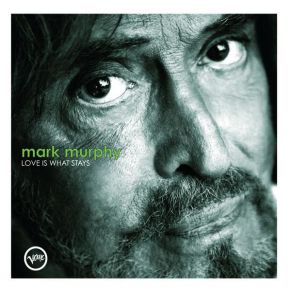Love Is What Stays
Download links and information about Love Is What Stays by Mark Murphy. This album was released in 2007 and it belongs to Jazz, Vocal Jazz genres. It contains 13 tracks with total duration of 01:03:54 minutes.

|
|
|---|---|
| Artist: | Mark Murphy |
| Release date: | 2007 |
| Genre: | Jazz, Vocal Jazz |
| Tracks: | 13 |
| Duration: | 01:03:54 |
| Buy it NOW at: | |
| Buy on iTunes $4.99 | |
| Buy on Amazon $55.22 | |
Tracks
[Edit]| No. | Title | Length |
|---|---|---|
| 1. | Stolen Moments | 2:40 |
| 2. | Angel Eyes | 8:04 |
| 3. | My Foolish Heart | 5:13 |
| 4. | So Doggone Lonesome | 4:49 |
| 5. | What If | 7:17 |
| 6. | The Interview | 5:40 |
| 7. | Once Upon a Summertime | 5:32 |
| 8. | Stolen Moments (1st Reprise) | 1:03 |
| 9. | Love Is What Stays | 6:41 |
| 10. | Stolen Moments (2nd Reprise) | 1:20 |
| 11. | Too Late Now | 7:53 |
| 12. | Blue Cell Phone | 3:03 |
| 13. | Did I Ever Really Live | 4:39 |
Details
[Edit]Mark Murphy's 2005 Verve album, Once to Every Heart, focused on the veteran jazz vocalist's rare, even singular ability with ballads and torch songs. Produced by Till Brönner, the great flügelhorn player, it was an album that brought Murphy's name back toward — if not into — the jazz mainstream and offered another side of his work to the ever hip European DJs who revere his catalog. Love Is What Stays is a deeply satisfying and, in places, even astonishing reflection on time and its passage. Memory, reverie, regrets, victories, hipster mysticism, and wonderfully canny theatrically poetic wordplay all come to bear in these songs. Released 50 years after his debut — when he was already being hailed as one of the music's great singers — it is more adventurous and downright wily in its aims than anyone could have hoped for. And those aims? They are reached with relative ease. The group of players is no less wide ranging: Lee Konitz makes an appearance on the one tune one might expect in such a collection, "My Foolish Heart." Elsewhere, however, Don Grusin shows up on Fender Rhodes; the Deutsches Symphonie Orchester Berlin appear on several tracks; and Chuck Loeb, Sebastian Merk, and others contribute as well. Murphy's version of the aforementioned track outdoes Kurt Elling's recent version; in his bass-baritone, full of smoke and ether, Murphy paints the entire scene as the strings and orchestra swell and back off. Konitz contributes a beautiful solo to boot.
And while jazz fans can take comfort in the fact that Murphy reads standards such as "Angel Eyes" and the Lane/Lerner nugget "Too Late Now," he also digs deep into Johnny Cash with a stellar, off-the-wall, and deeply soulful version of "So Doggone Lonesome," writes killer words to Oliver Nelson's "Stolen Moments," and completely reinvents the Michel Legrand classic "Once Upon a Summertime." Inside some of these tunes, and in others of his own composition such as the title track written with Brönner, "Blue Cell Phone," and "The Interview," Murphy's beat poetry — he's the last of the originals in jazz — and cosmic sense of intellectual inquiry make many of these tunes something entirely other: reinventions, redirections, and re-creations. There's also a big surprise here in that Murphy takes on "What If," the Coldplay single. Is it a pop song? It was. It is again in a new genre, thanks to Brönner's arrangement. In Murphy's golden throat it becomes a deeply intimate ballad with hushed and brushed cymbals and a tasteful atmospheric orchestral arrangement by Nan Schwartz. It's a jazz tune, and Brönner's fills make it dramatic. It's so soulful and utterly moving, with Murphy reaching into his lower register to get the emotion through the lyric, it could become a pop classic. Love Is What Stays is not simply another Mark Murphy album. It's a Mark Murphy event in the manner in which Rah! was in its day, or perhaps Midnight Mood, Bop for Kerouac, or his Savoy sides were. Those who are currently deeply into Elling should give a listen to his mentor; those who don't like jazz vocals in particular would do well to check this out; and others, looking for true authenticity and artfully made American popular music, should snap this up as quickly as possible. Time will be the judge, but Love Is What Stays may become a Murphy masterpiece and — let's face it — the man embodies the very essence of "hip." And always will.